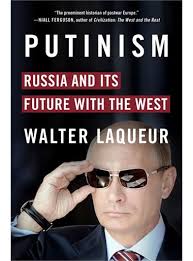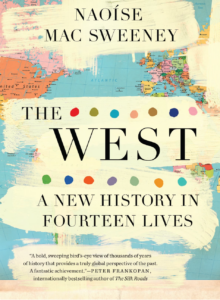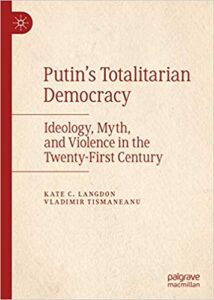Explanations linking Russia’s behavior to traditional geopolitics or fears of democratization fall flat as accounts of its full-scale invasion of Ukraine, says a leading analyst.
The war in Ukraine is not just about Russia’s territorial ambitions or a veto power over policies of a sovereign state. It is fueled by conspiracy theories about Russia’s enemies and narratives about its identity. The ideological dimensions of Russia’s war raise stakes in the ongoing conflict, lessen space for negotiation and compromise, and boost capacity for violence, argues Mariya Y. Omelicheva, a Professor of Strategy at National War College.

Russia’s aggression in Ukraine is a powerful reminder of the relevance of ideas for armed conflict, she writes in Great Power Image and Enemy-Making: The Role of Ideology in Russia’s War in Ukraine, an essay for Strategy Bridge:
Russia’s case is instructive in demonstrating how ideology does not need to be fixed into a rigid doctrine to provide a motive for war and increase the state capacity for violence. Neither does it need to be designed for export and actively promoted abroad. The Russian government, in fact, has never developed a coherent national ideology. Russia’s ideological space has always been fluid, giving rise to academic and policy debates about whether Russia is a fascist, authoritarian, or kleptocratic state. The Kremlin has complicated the task of identifying ideological foundations of Russia’s foreign policy by instrumentalizing ideological narratives for political uses.
The great repeated theme of Putin’s rhetoric is that the West constantly falls short of what Naoise Mac Sweeney calls “the principles that most Westerners consider to be central to Western identity today, principles of fundamental human equality and rights, social liberalism, and toleration,” notes Joshua Keating.
 It is not all that surprising that many governments in the “Global South,” another constantly invoked but vaguely defined directional grouping, have not fully bought into the Western narrative of the Ukraine war as an existential struggle for global democracy and self-determination, he writes in a Washington Post review of Mac Sweeney’s “The West: A New History in Fourteen Lives”:
It is not all that surprising that many governments in the “Global South,” another constantly invoked but vaguely defined directional grouping, have not fully bought into the Western narrative of the Ukraine war as an existential struggle for global democracy and self-determination, he writes in a Washington Post review of Mac Sweeney’s “The West: A New History in Fourteen Lives”:
At least in the foreign policy context, “the West” is generally used as shorthand for the free-market democracies of Europe and North America and a collective designation for the alphabet soup of multilateral institutions like the E.U., NATO, OECD and G-7. ….But most leaders and officials in Western governments today are careful to clarify they do not believe democracy, human rights or the rule of law are, in any way, inherently Western. As Secretary of State Antony Blinken put it when talking about Russian violations of international law, “We are not talking about Western values. We are talking about the common rules around the world.”
 Strategic thinkers can look to Russia’s experiences with producing and reproducing ideological constructs about itself, the West and Ukraine for discovering the mechanisms of ideological influence on state conduct. A mechanism that translated ideas and ideology into the Kremlin’s decision to wage an aggressive war suggests four analytical signposts, says Omelicheva, the author of Webs of Corruption: Trafficking-Terrorism Nexus in Central Asia, Democracy in Central Asia: Competing Perspectives and Alternate Strategies, and Counterterrorism Policies in Central Asia:
Strategic thinkers can look to Russia’s experiences with producing and reproducing ideological constructs about itself, the West and Ukraine for discovering the mechanisms of ideological influence on state conduct. A mechanism that translated ideas and ideology into the Kremlin’s decision to wage an aggressive war suggests four analytical signposts, says Omelicheva, the author of Webs of Corruption: Trafficking-Terrorism Nexus in Central Asia, Democracy in Central Asia: Competing Perspectives and Alternate Strategies, and Counterterrorism Policies in Central Asia:
- an approach to national identity that emphasizes intractable differences and elevates the Self by denigrating the Other;
- the growing consistency in the othering themes in the official, academic, and popular discourse (citing Robert Person & Michael McFaul’s 2022 Journal of Democracy essay, “What Putin Fears Most”);
- the institutionalization of these ideas in domestic legislation; and
- their translation into the everyday practices of statecraft.
“Acknowledging a connection between war and ideology marks a significant shift in contemporary strategic thinking which has long been hostile to the idea of a secular ideological struggle among modern states,” she adds. “Russia’s propaganda campaign against Ukraine offers useful analytical signposts for discerning the narratives of enemy-making necessitating the use of force.”
“During the first year of Russia’s barbaric war in Ukraine, the theme of Russia’s imperialist motivations has become popular in the Western policy circles.” – Mariya Omelicheva https://t.co/cAvMhH4QNI pic.twitter.com/UqMr0xkjyK
— The Strategy Bridge (@Strategy_Bridge) June 9, 2023







